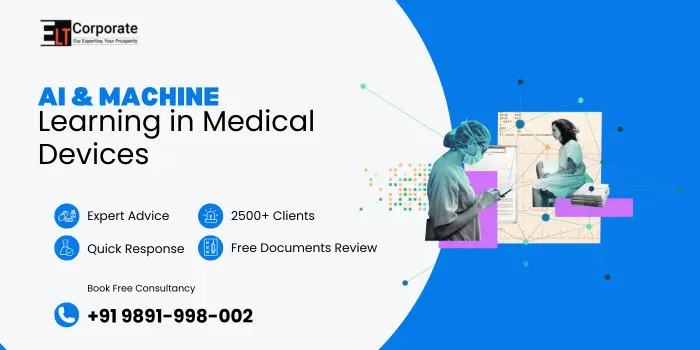The use of AI and Machine Learning in Medical Devices is transforming healthcare by enabling faster diagnosis, personalized treatments, and predictive care. From AI-based imaging tools to machine learning algorithms in wearable devices, these technologies are creating new opportunities. However, since medical devices directly affect human lives, strong regulations are needed to ensure safety, accuracy, and ethical use. Governments and health authorities worldwide, including India, are now updating their rules to keep pace with this technological shift.
What does AI And Machine Learning in Medical Devices Mean?
AI and Machine Learning in Medical Devices refers to the use of intelligent algorithms and self-learning systems inside healthcare equipment and software.
- AI-based imaging systems (MRI or CT scans).
- Wearables tracking heart rate and predicting health risks.
- Decision-support software for doctors.
Why are AI And Machine Learning in Medical Devices Becoming Important in Healthcare?
AI and Machine Learning in Medical Devices are important because they:
- Improve accuracy in diagnosis and treatment.
- Save time for doctors by analyzing large amounts of data.
- Personalize healthcare by predicting risks and recommending treatments.
- Increase access to healthcare in remote areas through smart devices.
This technology is creating a shift from reactive to predictive healthcare.
What are the Global Regulations for AI And Machine Learning in Medical Devices?
Globally, regulators are setting frameworks for AI and Machine Learning in Medical Devices:
- US FDA: Published a framework for AI/ML-based Software as a Medical Device (SaMD). It focuses on continuous learning systems.
- European Union MDR: Requires transparency, clinical evaluation, and strict data safety.
- WHO: Provides ethical guidance on the safe use of AI in health.
How are Indian Regulations Adapting for AI And Machine Learning in Medical Devices?
India is slowly updating its rules for AI and Machine Learning in Medical Devices:
- The CDSCO (Central Drugs Standard Control Organization) is the main authority.
- AI-based devices are regulated under the Medical Device Rules, 2017.
- India follows international practices like ISO standards and may take cues from FDA/EU guidelines.
- Draft policies are being discussed for digital health and AI under the Ministry of Health and NITI Aayog.
What role does CDSCO play in Regulating AI And Machine Learning in Medical Devices?
The CDSCO is responsible for:
- Approving new AI and Machine Learning in Medical Devices.
- Checking if they meet safety and performance standards.
- Issuing licenses for manufacturing and import.
- Coordinating with BIS (Bureau of Indian Standards) for technical compliance.
What Challenges do Regulators face in Adapting Rules for AI And Machine Learning in Medical Devices?
Some major challenges are:
- Continuous learning: AI devices update themselves, making it hard to fix one-time approvals.
- Data quality: Poor data can lead to wrong decisions.
- Ethics & bias: AI may show biased results if trained on limited data.
- Global alignment: Different countries have different rules, creating confusion for manufacturers.
How do Data Privacy and Cybersecurity Affect AI And Machine Learning in Medical Device Regulation?
Data privacy and cybersecurity are key parts of regulation because AI-based devices depend on sensitive patient data.
- Regulations ensure patients’ data is protected under privacy laws.
- Cybersecurity rules prevent hacking of medical devices (like pacemakers or monitoring devices).
- Regular audits and encryption are required.
What Safety and Performance Standards are Required for AI And Machine Learning in Medical Devices?
AI and Machine Learning in Medical Devices must follow:
- ISO 13485 – Quality management for medical devices.
- ISO 14971 – Risk management for medical devices.
- IEC 62304 – Software lifecycle standards.
Clinical validation to ensure devices are safe for real patients.
What Benefits will Clear Regulations bring for AI And Machine Learning in Medical Devices?
Having clear rules for AI and Machine Learning in Medical Devices will:
- Increase trust among doctors and patients.
- Provide a roadmap for manufacturers.
- Reduce delays in approval.
- Help India grow as a hub for digital health innovation.
- Encourage foreign investment in Indian med-tech.
Is AI & Machine Learning in Medical Devices already regulated in India?
Partially yes. They are covered under the Medical Device Rules, 2017, but special AI rules are still evolving.
Do AI & Machine Learning in Medical Devices need clinical trials?
Yes, if they affect patient health decisions, they must undergo testing and validation.


Comments are closed